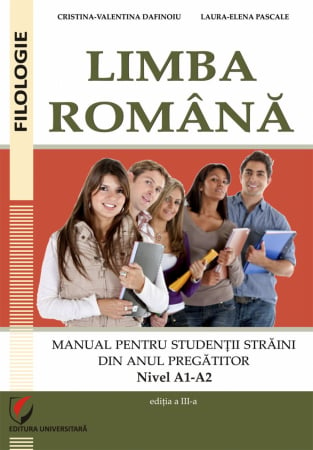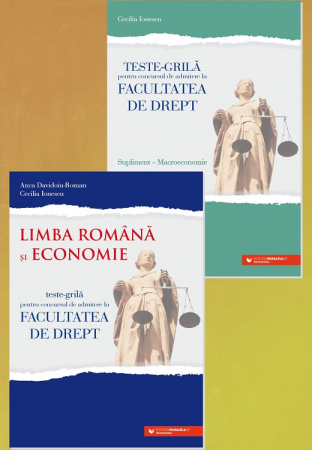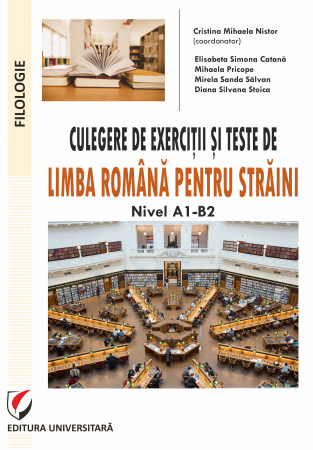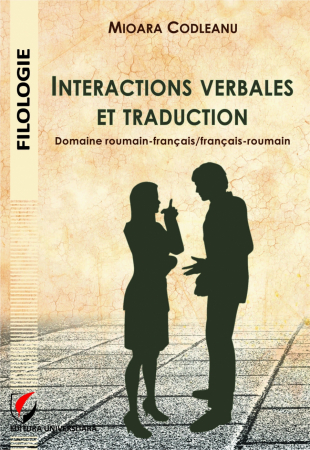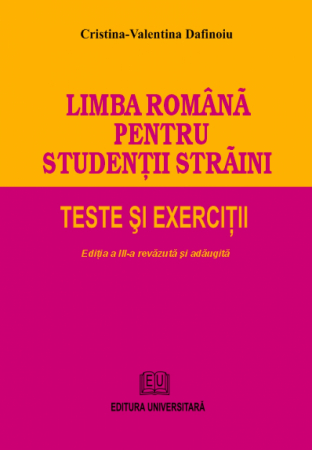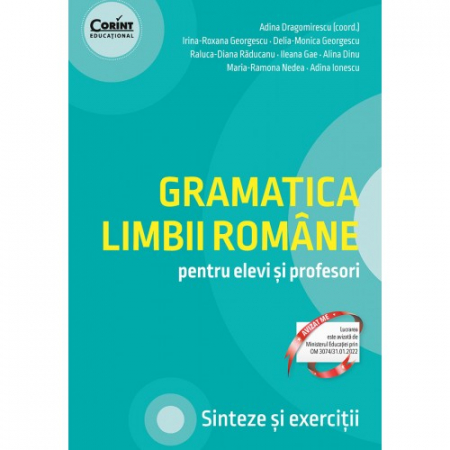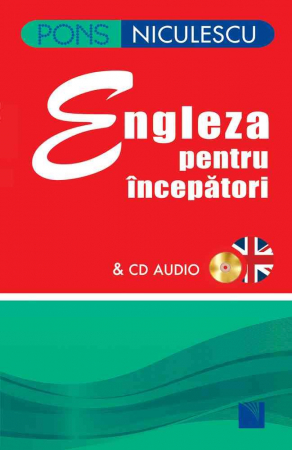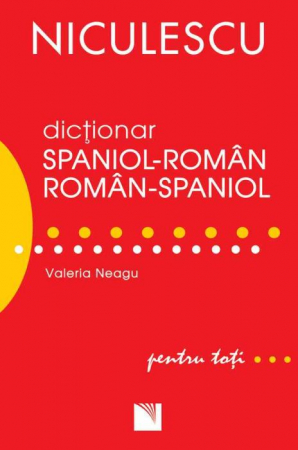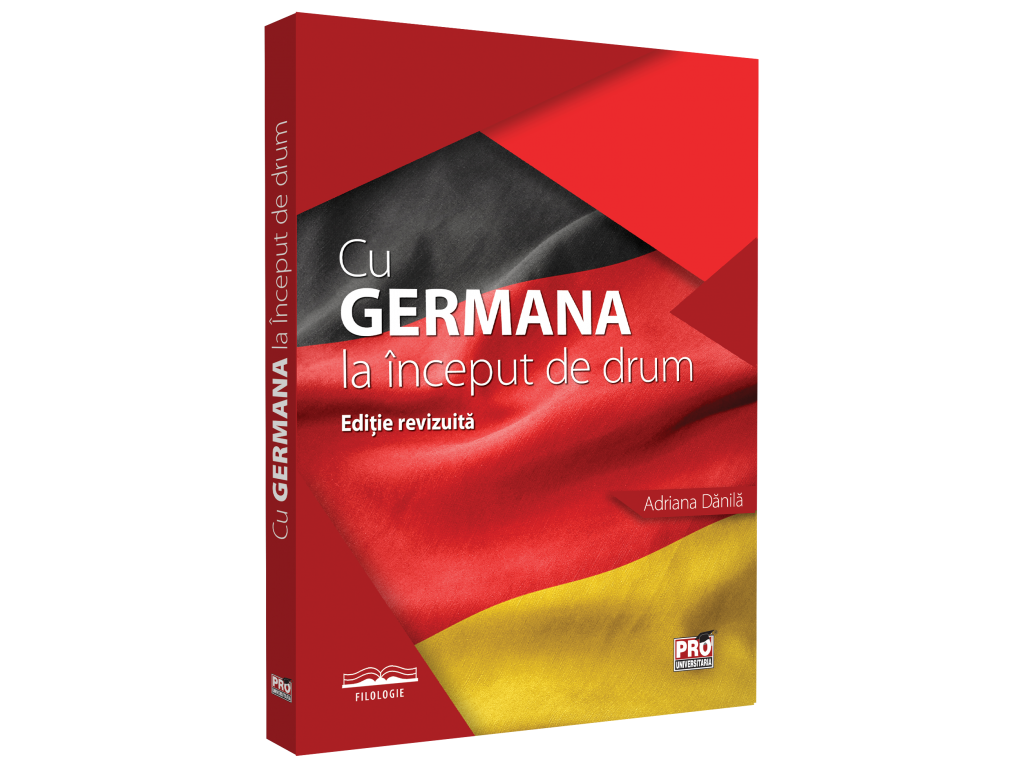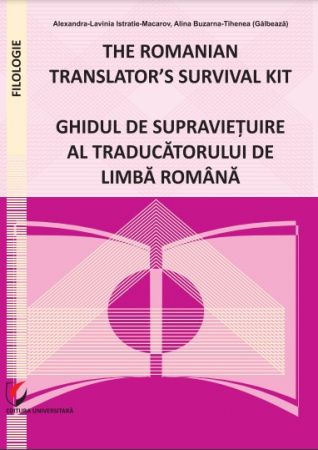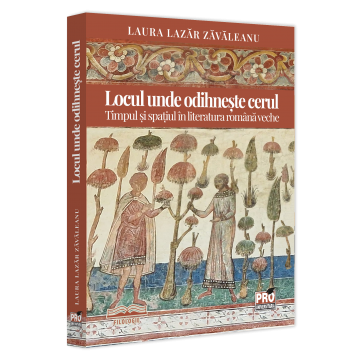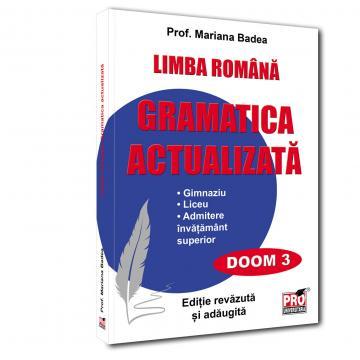Manuscript proposals: [email protected] / 0745 204 115 //// Tracking orders Individuals / Sales: 0745 200 357 / Orders Legal entities: 0721 722 783
ISBN: 978-606-28-1466-3
DOI: https://doi.org/10.5682/9786062814663
Publisher year: 2022
Edition: I
Pages: 218
Publisher: Editura Universitară
Author: Icbal Anefi
Product Code:
9786062814663
Do you need help?
0745 200 357
- Description
- Download (1)
- Authors
- Content
- More details
- Reviews (0)
The current work aims to create a "mirror" image of the history of the main translations of the Homeric poems Iliad and Odyssey into two modern languages - Romanian and Turkish. Our approach is, above all, one of the history of the literary language, approached from a strictly linguistic perspective, but also from a cultural perspective.
The premise from which we start is that the maturity of a national literary language is verified by confronting the great texts of the masterpieces of universal literature, along with the essential test, that of the ability to generate one's own original creations in the respective cultural-linguistic space. On the other hand, the translation of such works effectively contributes to the development of the beneficiary literary language, under all possible aspects - lexical, semantic, grammatical, stylistic. For a researcher of language structures, it is beyond any doubt that such translations facilitate the process of enrichment, nuance and plasticization of the receiving languages.
Secondly, our paper concerns the field of translation. The parallel analysis of some texts of such importance in the universal history of spirituality can help us to better understand the fundamental mechanisms of the act of translation, in their details, applied to two given languages, and the sources of the reception of masterpieces of ancient literary creation in the modern world, in principle.
I chose the comparative perspective for subjective reasons, first of all, as a person who belongs equally to the two languages and cultures. But, to these personal circumstances was added the idea that objectively there is a historical connection between the two languages, based on the historical-geographical belonging to a common space with great spiritual resources and through the political-economic and administrative-cultural relations that exceed, in time, a millennium and a half of fertile concretizations. On the other hand, although both languages and cultures belong to the Balkans, their evolution was quite different. Turkey developed, over a long period of time, as an empire - which absorbed elements of material and spiritual culture from several other peoples and then redistributed them to all the worlds, synthesized them, etc., after the natural dynamics of the circulation of human values, while Romania coagulated into a relatively small unitary state quite late, in a well-defined space both historically-geographically and spiritually, developing a specific culture. In addition, we are talking about two languages from different genealogical families and with different structural typologies. It is natural to expect great differences in the equivalence of the same Greek text, since one version is made in an inflectional language, and another - in an agglutinative language. We also expected, in principle, that the history of the reception of Homeric poems would be very different in a great empire, with a very old and very heterogeneous cultural evolution, in its structural unity, compared to that in a culture developed in a community relatively small ethno-linguistics, located on the edge of empires, where the syndrome of "insularity" and "loss of the strength of the waves" towards distant shores works in absolutely every field of social life.
However, we found, right from the beginning of our approach, that between the histories of the evolution of translations from Homer in the two modern Balkan languages there are more similarities than one would have thought. In the history of culture, differences in social-administrative status, military and political power do not always set the tone - this is one of the lessons that Homer offers us, in the context we are researching. For example, in both cultures, translations from Homer are attested late - practically, only from the 19th century, if we don't take into account the earlier fragmentary attempts - not even those older than the 18th century. But there is an advance of about half a century of more consistent translations entrusted to the printing press in the Romanian space compared to the Turkish one, which may seem bizarre, considering the material and cultural conditions between the two ethnolinguistic spaces, clearly in favor of the latter . Of course, Romanian's belonging to the Romance language family and, through them, to Western culture worked here, while Turkish culture was preferentially nourished by the rich and ancient Eastern spirituality. We can say, therefore, that the principle of structural compensation that works in the contact between two languages is also applicable in the broader framework of culture, in its entirety. There are always certain detail factors that favor, complement, nuance the specific developments in one culture, to make it compatible with another. Not to mention the universals of human thought, corresponding to their linguistic universals.
Starting from these considerations, we have proposed that in the following pages we will establish some essential data about the evolution of translations performed from the Iliad and the Odyssey in Romanian and Turkish, under various aspects: the historical and cultural context of the appearance of the various versions; the involvement of official institutions in the act of publishing and supporting translations; the translation strategies adopted by the different generations of translators; last but not least, the very special relationship between the evolution of the literary language, on the one hand, and the translations from Homer, on the other hand, in each of the two cultural spaces. In fact, the latter constituted the central, operational objective of our study, along with the general ones, resulting from what I stated above.
The premise from which we start is that the maturity of a national literary language is verified by confronting the great texts of the masterpieces of universal literature, along with the essential test, that of the ability to generate one's own original creations in the respective cultural-linguistic space. On the other hand, the translation of such works effectively contributes to the development of the beneficiary literary language, under all possible aspects - lexical, semantic, grammatical, stylistic. For a researcher of language structures, it is beyond any doubt that such translations facilitate the process of enrichment, nuance and plasticization of the receiving languages.
Secondly, our paper concerns the field of translation. The parallel analysis of some texts of such importance in the universal history of spirituality can help us to better understand the fundamental mechanisms of the act of translation, in their details, applied to two given languages, and the sources of the reception of masterpieces of ancient literary creation in the modern world, in principle.
I chose the comparative perspective for subjective reasons, first of all, as a person who belongs equally to the two languages and cultures. But, to these personal circumstances was added the idea that objectively there is a historical connection between the two languages, based on the historical-geographical belonging to a common space with great spiritual resources and through the political-economic and administrative-cultural relations that exceed, in time, a millennium and a half of fertile concretizations. On the other hand, although both languages and cultures belong to the Balkans, their evolution was quite different. Turkey developed, over a long period of time, as an empire - which absorbed elements of material and spiritual culture from several other peoples and then redistributed them to all the worlds, synthesized them, etc., after the natural dynamics of the circulation of human values, while Romania coagulated into a relatively small unitary state quite late, in a well-defined space both historically-geographically and spiritually, developing a specific culture. In addition, we are talking about two languages from different genealogical families and with different structural typologies. It is natural to expect great differences in the equivalence of the same Greek text, since one version is made in an inflectional language, and another - in an agglutinative language. We also expected, in principle, that the history of the reception of Homeric poems would be very different in a great empire, with a very old and very heterogeneous cultural evolution, in its structural unity, compared to that in a culture developed in a community relatively small ethno-linguistics, located on the edge of empires, where the syndrome of "insularity" and "loss of the strength of the waves" towards distant shores works in absolutely every field of social life.
However, we found, right from the beginning of our approach, that between the histories of the evolution of translations from Homer in the two modern Balkan languages there are more similarities than one would have thought. In the history of culture, differences in social-administrative status, military and political power do not always set the tone - this is one of the lessons that Homer offers us, in the context we are researching. For example, in both cultures, translations from Homer are attested late - practically, only from the 19th century, if we don't take into account the earlier fragmentary attempts - not even those older than the 18th century. But there is an advance of about half a century of more consistent translations entrusted to the printing press in the Romanian space compared to the Turkish one, which may seem bizarre, considering the material and cultural conditions between the two ethnolinguistic spaces, clearly in favor of the latter . Of course, Romanian's belonging to the Romance language family and, through them, to Western culture worked here, while Turkish culture was preferentially nourished by the rich and ancient Eastern spirituality. We can say, therefore, that the principle of structural compensation that works in the contact between two languages is also applicable in the broader framework of culture, in its entirety. There are always certain detail factors that favor, complement, nuance the specific developments in one culture, to make it compatible with another. Not to mention the universals of human thought, corresponding to their linguistic universals.
Starting from these considerations, we have proposed that in the following pages we will establish some essential data about the evolution of translations performed from the Iliad and the Odyssey in Romanian and Turkish, under various aspects: the historical and cultural context of the appearance of the various versions; the involvement of official institutions in the act of publishing and supporting translations; the translation strategies adopted by the different generations of translators; last but not least, the very special relationship between the evolution of the literary language, on the one hand, and the translations from Homer, on the other hand, in each of the two cultural spaces. In fact, the latter constituted the central, operational objective of our study, along with the general ones, resulting from what I stated above.
-
Homeric poems in Romanian and Turkish versions. A contrastive-typological approach
Download
ICBAL ANEFI was born in Constanta, in a family of intellectuals of Turkish-Tatar ethnicity. He graduated from the Constantin Bratescu National Pedagogical College in Constanta, class of 1996, then attended the courses of the University Pedagogical College of Ovidius Constanta University, specializing in Institutes - Turkish Language, graduated in 2001. He then studied at the Faculty of Education Sciences, Primary Education section and preschool, from the same university, receiving his bachelor's degree in 2010. He also completed the bachelor's program, specializing in Romanian language and literature - Turkish language and literature, as well as the master's program, specializing in Communication and Intercultural Discourse in the European Space, both at the Faculty of Letters of the Ovidius University in Constanta. Among the many post-graduate studies he followed over time, in Bucharest, Constanta, Istanbul, etc., the Management program of Pre-university Education Units stands out. He is a doctor in Philology, with a thesis submitted at the Doctoral School of Humanities of Ovidius Constanta University, under the scientific supervision of Prof. univ. dr. emeritus Petre Gheorghe Barlea.
He participated in numerous national and international symposia, colloquiums and congresses. He has published studies and researchers on language and literature didactics, translation studies, interculturality and cultural identity.
She is a holder in the pre-university education system and an inspector for the training and education of minority communities in Dobrogea at the School Inspectorate of Constanta County.
He participated in numerous national and international symposia, colloquiums and congresses. He has published studies and researchers on language and literature didactics, translation studies, interculturality and cultural identity.
She is a holder in the pre-university education system and an inspector for the training and education of minority communities in Dobrogea at the School Inspectorate of Constanta County.
FOREWORD (P. Gh. BARLEA) / 9
ACRONYMS AND ABBREVIATIONS / 13
INTRODUCTION / 19
Motivation / 19
Research stage / 21
The working material / 22
Work methods / 25
Terminological specifications / 35
CHAPTER I
ALTERNATIVE OPTIONS AND FORMULAS IN THE TRANSLATION OF HOMERIC TEXTS / 38
Translation of literary texts - socio-linguistic and cultural implications / 38
Translation as process and product / 39
Translation as cultural adaptation / 41
Translation as intercultural verbal interaction / 43
Translational options as an identity document / 49
Cultural identity or interpretive subjectivity? / 51
The role and importance of translations in the cultural space / 56
Conclusions regarding the translation options and formulas / 58
CHAPTER II
STAGES OF THE TRANSLATION OF THE HOMERIC TEXTS IN ROMANIAN AND TURKISH / 59
Homeric problem / 59
Homer and his posterity / 59
The journeys of Homeric texts / 61
The evolution of the translation of Homeric texts into the Romanian language / 65
2.2.1. Stage of the pioneers / 66
2.2.1.1. Costache D. Aristia / 66
2.2.1.2. Ioan D. Caragiani / 72
2.2.2. Stage of the "great moose" / 75
2.2.2.1. George Murnu – the Homerid poet / 75
2.2.2.2. George Cosbuc and the Romanian translation version "in suveica" / 81
2.2.2.3. Cezar Papacostea and the Erasmical interpretation of Helen / 85
2.2.2.4. Eugen Lovinescu – translation from the perspective of the "mutation of aesthetic values" theory / 91
2.2.3. Stage of academic translations / 98
2.2.3.1. The impact of translation studies on the Romanian versions of the Homeric texts / 98
2.2.3.2. Radu Hancu and the first complete prose version of the "Iliad" / 101
2.2.3.3. Dan Slusanschi and the triumph of academic versions in the Romanian language / 104
2.2.3.4. Conclusions regarding the translations of Homeric poems in Romanian / 111
The evolution of the translation of Homeric texts into Turkish / 115
Information about the translation of Sadullah Pasa / 115
Translated by Naim M. Fraseri / 116
Hilmi's translation from Thessaloniki / 116
Celal Arıkdemir – the first writing in the Latin alphabet / 117
Ahmet Cevat Emre – the first complete translation of the "Iliad" / 117
Yasar Nabi - between biography and free translation / 118
Azra Erhat and Abdul Kadir - science and poetry in the service of Turkish versions of Homeric poems / 120
The "translation" of Derya Ozturk - a first example of processing a text in Turkish / 124
Academic translation of Sema Sandalçι / 124
"Translations of translations" or indirect translations / 125
Re‑translations, processing and paraphrasing of the "Iliad" and "Odyssey" nowadays / 126
Conclusions regarding the translations of Homeric poems in Turkish / 128
Conclusions regarding the stages of translation of Homeric texts into Romanian and Turkish / 130
CHAPTER III
LEXICO-SEMANTIC AND GRAMMATICAL ASPECTS OF THE HOMERIC TEXT / 133
3.1. Peculiarities of the base text / 133
3.1.1. The compositional structure of the analyzed text / 133
3.1.2. The grammar of the basic text and its stylistic-pragmatic implications / 133
3.1.2.1. Verb / 133
3.1.2.2. Adverb / 137
3.1.2.3. The noun / 138
3.1.2.4. The adjective / 139
3.1.2.5. Pronouns / 140
3.1.2.6. Phrastic and transphrastic connectors / 140
3.1.2.7. Sentence and phrase syntax / 141
3.2. Analysis of the Romanian versions / 143
3.2.1. Corpus of texts / 143
3.2.2. Morpho-syntax of the Romanian versions / 144
3.2.2.1. Verb / 144
3.2.2.2. Adverb / 147
3.2.2.3. The noun / 148
3.2.2.3.1. Proper names / 148
3.2.2.3.2. Common names / 152
3.2.2.4. The adjective / 154
3.2.2.5. Pronouns / 156
3.2.2.6. Syntactic-discursive connectors / 158
3.2.2.7. Sentence and phrase syntax / 159
3.2.2.8. Observations regarding the translation strategies in the Romanian versions / 161
3.3. Analysis of the Turkish versions / 163
3.3.1. Peculiarities of the Turkish language system / 163
3.3.2. The discursive-syntactic aspect of translations in the Turkish language / 169
3.3.3. Corpus of texts / 171
3.3.4. Analysis of phonetic, lexical, grammatical and pragmatic-stylistic features / 173
3.3.4.1. Specific phonetic phenomena / 173
3.3.4.2. Lexical-semantic aspects / 176
3.3.4.3. The morpho-syntax of the Turkish versions of the "Iliad" / 177
3.3.4.3.1. Verb / 177
3.3.4.3.2. Adverb / 182
3.3.4.3.3. The noun / 185
3.3.4.3.3.1. Proper names / 185
3.3.4.3.3.2. Common names / 188
3.3.4.3.4. The adjective / 192
3.3.4.3.5. Pronouns / 193
3.3.4.3.6. Sentence and phrase syntax / 195
3.3.5. Poetry and prose in modern translations of Homeric poems in Turkish / 196
3.4. Translation strategies in the Romanian and Turkish versions of the Homeric poems / 198
GENERAL CONCLUSIONS / 204
BIBLIOGRAPHY / 210
1. Sources / 210
1.1. Editions of the base text / 210
1.2. Editions in Romanian language / 210
1.2.1. The Iliad / 210
1.2.2. Odyssey / 211
1.2. Editions in Turkish / 212
1.3.1. The Iliad / 212
1.3.2. Odyssey / 212
2. References / 212
3. Dictionaries / 218
ACRONYMS AND ABBREVIATIONS / 13
INTRODUCTION / 19
Motivation / 19
Research stage / 21
The working material / 22
Work methods / 25
Terminological specifications / 35
CHAPTER I
ALTERNATIVE OPTIONS AND FORMULAS IN THE TRANSLATION OF HOMERIC TEXTS / 38
Translation of literary texts - socio-linguistic and cultural implications / 38
Translation as process and product / 39
Translation as cultural adaptation / 41
Translation as intercultural verbal interaction / 43
Translational options as an identity document / 49
Cultural identity or interpretive subjectivity? / 51
The role and importance of translations in the cultural space / 56
Conclusions regarding the translation options and formulas / 58
CHAPTER II
STAGES OF THE TRANSLATION OF THE HOMERIC TEXTS IN ROMANIAN AND TURKISH / 59
Homeric problem / 59
Homer and his posterity / 59
The journeys of Homeric texts / 61
The evolution of the translation of Homeric texts into the Romanian language / 65
2.2.1. Stage of the pioneers / 66
2.2.1.1. Costache D. Aristia / 66
2.2.1.2. Ioan D. Caragiani / 72
2.2.2. Stage of the "great moose" / 75
2.2.2.1. George Murnu – the Homerid poet / 75
2.2.2.2. George Cosbuc and the Romanian translation version "in suveica" / 81
2.2.2.3. Cezar Papacostea and the Erasmical interpretation of Helen / 85
2.2.2.4. Eugen Lovinescu – translation from the perspective of the "mutation of aesthetic values" theory / 91
2.2.3. Stage of academic translations / 98
2.2.3.1. The impact of translation studies on the Romanian versions of the Homeric texts / 98
2.2.3.2. Radu Hancu and the first complete prose version of the "Iliad" / 101
2.2.3.3. Dan Slusanschi and the triumph of academic versions in the Romanian language / 104
2.2.3.4. Conclusions regarding the translations of Homeric poems in Romanian / 111
The evolution of the translation of Homeric texts into Turkish / 115
Information about the translation of Sadullah Pasa / 115
Translated by Naim M. Fraseri / 116
Hilmi's translation from Thessaloniki / 116
Celal Arıkdemir – the first writing in the Latin alphabet / 117
Ahmet Cevat Emre – the first complete translation of the "Iliad" / 117
Yasar Nabi - between biography and free translation / 118
Azra Erhat and Abdul Kadir - science and poetry in the service of Turkish versions of Homeric poems / 120
The "translation" of Derya Ozturk - a first example of processing a text in Turkish / 124
Academic translation of Sema Sandalçι / 124
"Translations of translations" or indirect translations / 125
Re‑translations, processing and paraphrasing of the "Iliad" and "Odyssey" nowadays / 126
Conclusions regarding the translations of Homeric poems in Turkish / 128
Conclusions regarding the stages of translation of Homeric texts into Romanian and Turkish / 130
CHAPTER III
LEXICO-SEMANTIC AND GRAMMATICAL ASPECTS OF THE HOMERIC TEXT / 133
3.1. Peculiarities of the base text / 133
3.1.1. The compositional structure of the analyzed text / 133
3.1.2. The grammar of the basic text and its stylistic-pragmatic implications / 133
3.1.2.1. Verb / 133
3.1.2.2. Adverb / 137
3.1.2.3. The noun / 138
3.1.2.4. The adjective / 139
3.1.2.5. Pronouns / 140
3.1.2.6. Phrastic and transphrastic connectors / 140
3.1.2.7. Sentence and phrase syntax / 141
3.2. Analysis of the Romanian versions / 143
3.2.1. Corpus of texts / 143
3.2.2. Morpho-syntax of the Romanian versions / 144
3.2.2.1. Verb / 144
3.2.2.2. Adverb / 147
3.2.2.3. The noun / 148
3.2.2.3.1. Proper names / 148
3.2.2.3.2. Common names / 152
3.2.2.4. The adjective / 154
3.2.2.5. Pronouns / 156
3.2.2.6. Syntactic-discursive connectors / 158
3.2.2.7. Sentence and phrase syntax / 159
3.2.2.8. Observations regarding the translation strategies in the Romanian versions / 161
3.3. Analysis of the Turkish versions / 163
3.3.1. Peculiarities of the Turkish language system / 163
3.3.2. The discursive-syntactic aspect of translations in the Turkish language / 169
3.3.3. Corpus of texts / 171
3.3.4. Analysis of phonetic, lexical, grammatical and pragmatic-stylistic features / 173
3.3.4.1. Specific phonetic phenomena / 173
3.3.4.2. Lexical-semantic aspects / 176
3.3.4.3. The morpho-syntax of the Turkish versions of the "Iliad" / 177
3.3.4.3.1. Verb / 177
3.3.4.3.2. Adverb / 182
3.3.4.3.3. The noun / 185
3.3.4.3.3.1. Proper names / 185
3.3.4.3.3.2. Common names / 188
3.3.4.3.4. The adjective / 192
3.3.4.3.5. Pronouns / 193
3.3.4.3.6. Sentence and phrase syntax / 195
3.3.5. Poetry and prose in modern translations of Homeric poems in Turkish / 196
3.4. Translation strategies in the Romanian and Turkish versions of the Homeric poems / 198
GENERAL CONCLUSIONS / 204
BIBLIOGRAPHY / 210
1. Sources / 210
1.1. Editions of the base text / 210
1.2. Editions in Romanian language / 210
1.2.1. The Iliad / 210
1.2.2. Odyssey / 211
1.2. Editions in Turkish / 212
1.3.1. The Iliad / 212
1.3.2. Odyssey / 212
2. References / 212
3. Dictionaries / 218
Focused equally on the issues of the history of the literary language and translation studies, the novelty of the research undertaken by Icbal S. Anefi comes from the double perspective of the confrontation of some literary texts: once, between a base language and a target language and once again, between two target languages. If we also take into account the fact that language A is not at all available to anyone, because it is an old, special idiom, transmitted to posterity exclusively in the poetic version of the Homeric texts, we already have a first idea of the difficult task undertaken by the young researcher. If we also add the fact that the object of the research is represented by two modern idioms, totally different in genealogical family and in typological structure, then we have an almost complete picture of the approach in which Icbal Anefi was involved. The B1 language and the B2 language are Romanian and Turkish respectively, i.e. the usual and the mother tongue for the author of the present study, both being treated from a predominantly diachronic perspective, a detail that completes the configuration of the philological course in which the author has embarked.
The premise from which he started is clearly expressed in the introductory chapter, written according to all the rules of a classical study: there is a biunivocal relationship between the stage of development of a modern language and the translation of Homeric poems (as of any masterpiece of universal literature, by the way) - each contributing to the good evolution of the other. On the other hand, the treatment of these translations from a double contrastive typological perspective can account for the functioning of some mechanisms of the generation of linguistic structures, of the mentalities of each human community for which the respective translations were made, considering the relationship between language and thought.
The corpus of texts is compiled according to the proposed analytical approach. About ten versions from each modern language (bringing together, in varying proportions, the Iliad and the Odyssey) are confronted with the Homeric text, in highly scholarly editions.
The methods, principles and working tools are naturally imposed by the objectives already mentioned here. They belong to diachronic linguistics, to typological contrastive grammar, to translation studies, to the theory of mentalities, each with its specific subfields.
The structure of the work is balanced, the introduction preparing the good reception of the entire research, and the first chapter carrying out a review of the theoretical and practical problems of translation. A detailed history of the versions of the Homeric poems in the two languages followed by a grammatical analysis of some representative fragments from both series of versions constitutes the essence of the work. More precisely, the analyzes aim at phonological aspects of the texts, morphological and syntactic phenomena in the process of linguistic transfer, pragmatic-stylistic peculiarities.
The conclusions formulated confirm the premises from which the research started and bring into focus many other aspects related to the act of translating the great works of mankind.
Among the general observations, it is worth noting that nowhere, in the researched versions, is the question of any specific strategy, methods and procedures, i.e. unique and systematically applied. The analyzes carried out on the versions in two different languages, made in different eras, respectively in different historical conditions, lead to the conclusion that it is always about relatively visible prevailing trends, but not about exclusivity. The reality is that all, absolutely all Romanian and Turkish versions are the result of a polyphonic translational approach. They are literal and literary translations, throughout the same text, with sometimes nuanced and contradictory interventions (additions, loss of lexical, semantic and grammatical or stylistic elements), with the more subtle or more ostentatious impregnation of the mentalities of the time and place where the translation was made, with the marking of the interpreter's personality. In other words, like any other translation, they are also integrated – naturally, humanly speaking – into the culture of the linguistic environment of the newly created text.
In the work we are discussing here, we talk about the principle launched - with great success, at the time - by Walter Benjamin, in the "Preface" to the German version made by him of Poems in Prose, the volume of Charles Baudelaire, in 1923 (cf. Charles Baudelaire, Tableaux Parisiens. German translation with a preface on the task of the translator, French and German version, Verlag von Richard Weißbach, Heidelberg 1923. https://dero.abcdef.wiki/wiki/Walter_Benjamin#Einf%C3%BChrungen), and namely, "the principle of liberation of pure language". Specifically, the "pure language" of an original text is freed from captivity by translation, if it is of good quality. Famous examples are the translations made by St. Jerome from the hebraica veritas (and not directly from the Septuagint, in fact, not only from it, as has recently been established), by Johann Heinrich Voss from the Iliad and the Odyssey, by Hölderlin from the tragedies of Sophocles ( Antigone and Oedipus the King) and
The premise from which he started is clearly expressed in the introductory chapter, written according to all the rules of a classical study: there is a biunivocal relationship between the stage of development of a modern language and the translation of Homeric poems (as of any masterpiece of universal literature, by the way) - each contributing to the good evolution of the other. On the other hand, the treatment of these translations from a double contrastive typological perspective can account for the functioning of some mechanisms of the generation of linguistic structures, of the mentalities of each human community for which the respective translations were made, considering the relationship between language and thought.
The corpus of texts is compiled according to the proposed analytical approach. About ten versions from each modern language (bringing together, in varying proportions, the Iliad and the Odyssey) are confronted with the Homeric text, in highly scholarly editions.
The methods, principles and working tools are naturally imposed by the objectives already mentioned here. They belong to diachronic linguistics, to typological contrastive grammar, to translation studies, to the theory of mentalities, each with its specific subfields.
The structure of the work is balanced, the introduction preparing the good reception of the entire research, and the first chapter carrying out a review of the theoretical and practical problems of translation. A detailed history of the versions of the Homeric poems in the two languages followed by a grammatical analysis of some representative fragments from both series of versions constitutes the essence of the work. More precisely, the analyzes aim at phonological aspects of the texts, morphological and syntactic phenomena in the process of linguistic transfer, pragmatic-stylistic peculiarities.
The conclusions formulated confirm the premises from which the research started and bring into focus many other aspects related to the act of translating the great works of mankind.
Among the general observations, it is worth noting that nowhere, in the researched versions, is the question of any specific strategy, methods and procedures, i.e. unique and systematically applied. The analyzes carried out on the versions in two different languages, made in different eras, respectively in different historical conditions, lead to the conclusion that it is always about relatively visible prevailing trends, but not about exclusivity. The reality is that all, absolutely all Romanian and Turkish versions are the result of a polyphonic translational approach. They are literal and literary translations, throughout the same text, with sometimes nuanced and contradictory interventions (additions, loss of lexical, semantic and grammatical or stylistic elements), with the more subtle or more ostentatious impregnation of the mentalities of the time and place where the translation was made, with the marking of the interpreter's personality. In other words, like any other translation, they are also integrated – naturally, humanly speaking – into the culture of the linguistic environment of the newly created text.
In the work we are discussing here, we talk about the principle launched - with great success, at the time - by Walter Benjamin, in the "Preface" to the German version made by him of Poems in Prose, the volume of Charles Baudelaire, in 1923 (cf. Charles Baudelaire, Tableaux Parisiens. German translation with a preface on the task of the translator, French and German version, Verlag von Richard Weißbach, Heidelberg 1923. https://dero.abcdef.wiki/wiki/Walter_Benjamin#Einf%C3%BChrungen), and namely, "the principle of liberation of pure language". Specifically, the "pure language" of an original text is freed from captivity by translation, if it is of good quality. Famous examples are the translations made by St. Jerome from the hebraica veritas (and not directly from the Septuagint, in fact, not only from it, as has recently been established), by Johann Heinrich Voss from the Iliad and the Odyssey, by Hölderlin from the tragedies of Sophocles ( Antigone and Oedipus the King) and
If you want to express your opinion about this product you can add a review.
write a review

6359.png)
![Homeric poems in Romanian and Turkish versions. A contrastive-typological approach - Icbal Anefi [1] Homeric poems in Romanian and Turkish versions. A contrastive-typological approach - Icbal Anefi [1]](https://gomagcdn.ro/domains/editurauniversitara.ro/files/product/large/970567.jpg)
